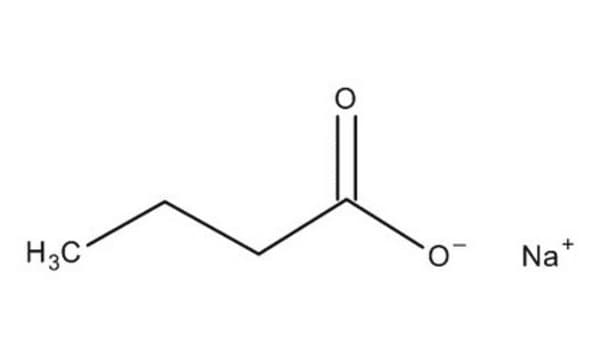S5636
Sodium acetate
powder, BioReagent, suitable for electrophoresis, suitable for cell culture, suitable for insect cell culture, ≥99%
Sinonimo/i:
Acetic acid sodium salt
About This Item
Prodotti consigliati
Nome Commerciale
BioReagent
Saggio
≥99%
Forma fisica
powder
solid
Temp. autoaccensione
1112 °F
tecniche
cell culture | insect: suitable
cell culture | mammalian: suitable
electrophoresis: suitable
Impurezze
≤0.001% hevay metals (as lead)
≤0.01% insoluble matter
pH
8.9 (25 °C, 100 mg/mL in water, 0.1 M agueous sodium acetate solution)
pKa
4.76 (acetic acid)
Punto di fusione
>300 °C (dec.) (lit.)
Solubilità
H2O: 0.5 g/10 mL
Anioni in tracce
chloride (Cl-): ≤0.035%
sulfate (SO42-): ≤0.003%
Compatibilità
suitable for electrophoresis buffers
applicazioni
diagnostic assay manufacturing
Stringa SMILE
[Na+].CC([O-])=O
InChI
1S/C2H4O2.Na/c1-2(3)4;/h1H3,(H,3,4);/q;+1/p-1
VMHLLURERBWHNL-UHFFFAOYSA-M
Cerchi prodotti simili? Visita Guida al confronto tra prodotti
Codice della classe di stoccaggio
11 - Combustible Solids
Classe di pericolosità dell'acqua (WGK)
WGK 1
Punto d’infiammabilità (°F)
Not applicable
Punto d’infiammabilità (°C)
Not applicable
Dispositivi di protezione individuale
Eyeshields, Gloves, type N95 (US)
Certificati d'analisi (COA)
Cerca il Certificati d'analisi (COA) digitando il numero di lotto/batch corrispondente. I numeri di lotto o di batch sono stampati sull'etichetta dei prodotti dopo la parola ‘Lotto’ o ‘Batch’.
Possiedi già questo prodotto?
I documenti relativi ai prodotti acquistati recentemente sono disponibili nell’Archivio dei documenti.
I clienti hanno visto anche
Il team dei nostri ricercatori vanta grande esperienza in tutte le aree della ricerca quali Life Science, scienza dei materiali, sintesi chimica, cromatografia, discipline analitiche, ecc..
Contatta l'Assistenza Tecnica.







